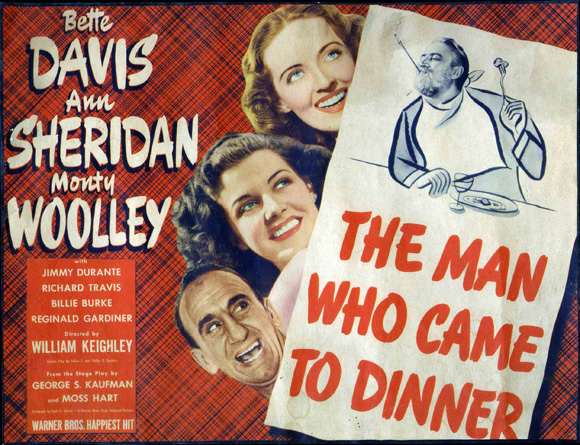
THE MAN WHO CAME TO DINNER
US, 1942, 112 minutes, Black and white.
Bette Davis, Ann Sheridan, Monty Woolley, Jimmy Durante, Billie Burke, Reginald Gardiner, Mary Wickes.
Directed by William Keighley.
The Man Who Came To Dinner is based on a celebrated play by Moss Hart and George Kaufman. It was adapted for the screen by the brothers, Julius and Philip Epstein (who were to win an Oscar the next year for Casablanca).
The film focuses on the egocentric Sheridan Whiteside, a professor who slips on the ice at the entrance of an Ohio home and is forced to spend some time there laid up – although he soon discovers that his leg is not broken and he bribes the doctor to stay so that he can intervene in the lives of all the people in the household. Monty Woolley is very good as Sheridan Whiteside. The film also has interesting cast led by Bette Davis and Ann Sheridan with an appearance by Jimmy Durante. Mary Wickes appears as the nurse – and was still going fifty years later in such films as Sister Act.
The film was directed by William Keighley who had directed Errol Flynn The Adventures of Robin Hood.
A television version in England in 1947 had Frank Pettingill as Sheridan Whiteside. A television version in 1972 had Orson Welles supported by Lee Remick. Nathan Lane took on the role in a television version in 2000.
1. This is a celebrated comedy. It is considered a classic film. Can you see why? Do you agree? What were its best features?
2. The film as a comedy. Was it a laugh comedy? A comedy of situations? How important was the dialogue for the film? Especially the outrageous statements of Sheridan Whiteside? What were your reactions to these outrageous statements?
3. The film was based on a play. Was this evident? The fall at the beginning and the fall at the end? The confining of the action mainly to the one room? Did this detract from the film? Why?
4. The irony of the title? What kind of person was Sheridan Whiteside? Was he credible as a real person? Why was he so outrageous? What opinion did he really have of himself? Why was he so brutal to others? At times he said he was kindly. He was very selective in his kindness? Was he selfish even in his kindness? Why was he so self-opinionated? Why so self-centred? Was he presented as a rounded personality or a caricature?
5. Maggie - what kind of a person was she? How did her personality and character contrast with his? Did this provide for some objectivity of judgement of Whiteside's behaviour? Why had Maggie stayed with him? Did she appreciate the good in him? Why did he want to possess her and prevent her marriage? Should Maggie have descended to the same kind of tactics to defeat him? Why was she almost defeated by Whiteside and his counter tactics? Were you happy at the happy ending? Why?
6. Bert: as a naive hero, as not taking notice of Whiteside, of winning Whiteside's friendship? Why did Whiteside oppose his marriage? How was he victimised by Whiteside and Lorraine? Why did he not see this?
7. The character of Lorraine? the satire implied? The Hollywood star? Chasing after an English title and money? A manipulator, yet manipulated? Did you feel sorry for her when she was tricked? Why?
8. Were the Stanley family poked fun at? Or should we have sympathised with them? How much did they suffer at Whiteside's expense? Did they deserve Whiteside's interfering with the life of their son and daughter?
9. The character of Banjo? was he sympathetic? Or irritating? What did he contribute to the working out of the plot?
10. The interlude with Beverley? and his tricking of Lorraine? Was this humorous? Was it cruel?
11. The film was very caustic in its humour, and rave insight via its caustic humour. Which sequences best illustrated this? how much insight into human behaviour was shown even in the exaggeration and the caricature?